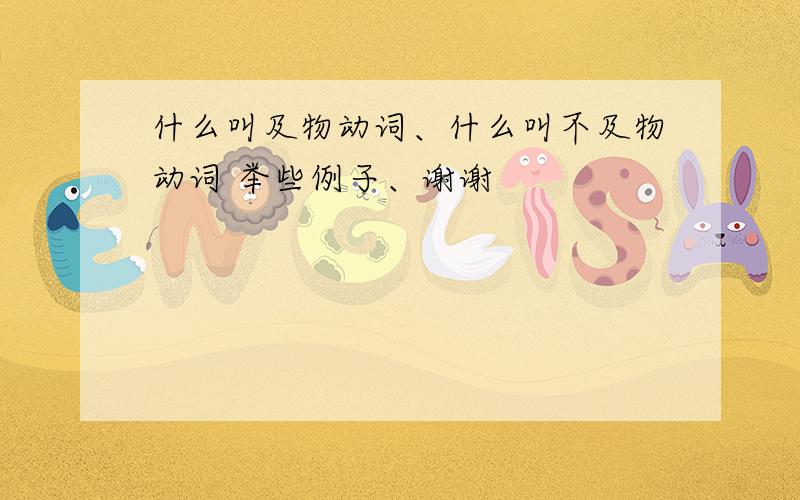什么叫及物动词、什么叫不及物动词 举些例子、谢谢
来源:学生作业帮助网 编辑:作业帮 时间:2024/04/29 10:47:37

什么叫及物动词、什么叫不及物动词 举些例子、谢谢
什么叫及物动词、什么叫不及物动词 举些例子、谢谢
什么叫及物动词、什么叫不及物动词 举些例子、谢谢
什么叫及物动词呢,先把概念告诉大家,必须加宾语意思才完整的动词,就是及物动词.不及物动词,就是不必加宾语意思就完整的动词.
举两个例子,“give”,I will give…,give的是什么呢,这不完整,说明give是助动词,必须加宾语,可以说I will give you a book.这个give就是及物动词.接下来再举一例,“listen”,I am listening,意思完整,不用加宾语意思就完整,这个词就是不及物动词,不是说不及物动词就不能加宾语,也能加,但是加的时候要加一个介词,如listen to me,一定要加介词.
下面是一些用法:
1、及物动词后面必须接宾语的动词叫做及物动词.有的动词必须接一个宾语,有的必须接两个宾语.
单宾语
He\'sreadingamagazine.
他正在读一本杂志.
双宾语
MrZhangteachesusEnglish.
张老师教我们英语.
复合宾语必须接一个宾语同时接一个补语
Weoftenhearhimsinginthepark.
我们经常听到他在公园里唱歌.
2、不及物动词本身意义完整,后面不需要接宾语.
例如:
Therainstopped.
雨停了.
Whathappenedyesterday?
昨天发生了什么?
注意:不及物动词没有被动语态.
3、实际上很多动词既是及物动词,又是不及物动词.我举一个例子,就说write.如Iamwriting.和Iamwritingaletter.在前一个句子write是不及物动词,在后一个句子write是及物动词.又如,see是及物动词,但在特殊情况下如seeingisbelieving
A 有些动词只是及物动词; 它们不可以单独用,后面必须跟宾语。
{ False: They always want after lunch.
Right: They always want a cup of tea after lunch.
{ False: He is sending now.
Right: He is sending a letter now....
全部展开
A 有些动词只是及物动词; 它们不可以单独用,后面必须跟宾语。
{ False: They always want after lunch.
Right: They always want a cup of tea after lunch.
{ False: He is sending now.
Right: He is sending a letter now.
B 有些动词只是不及物动词;它们可以单独用,如果后面想接宾语,动词后面必须加上介词。
{ Right: He is looking around.
False: He is looking me.
Right: He is looking at me.
{ Right: He is listening carefully.
False: He is listening the teacher carefully.
Right: He is listening to the teacher carefully.
C 有些动词既是及物动词,又是不及物动词; 但是有时候词义会改变。
{ The customer is asking loudly.
The customer is asking for you now.
The customer is asking a question now.
{ If you work hard, you will succeed.
If you work hard, you will succeed in passing the exam (same meaning).
If you work hard, you will succeed John as the manager of this company (different meaning).
收起
动词后可以直接跟名词的那个动词就是及物动词,标号为vt.如arrive
不可直接跟名词(必须加上介词)的动词是不及物动词,标号为vi.如travel
及物动词后跟宾语。{ False: They always want after lunch.
Right: They always want a cup of tea after lunch.
{ False: He is sending now.
Right: He is sending a letter now.
不及物动词;它们可以单独用,如果后面想接宾...
全部展开
及物动词后跟宾语。{ False: They always want after lunch.
Right: They always want a cup of tea after lunch.
{ False: He is sending now.
Right: He is sending a letter now.
不及物动词;它们可以单独用,如果后面想接宾语,动词后面必须加上介词{ Right: He is looking around.
False: He is looking me.
Right: He is looking at me.
{ Right: He is listening carefully.
False: He is listening the teacher carefully.
Right: He is listening to the teacher carefully.
收起